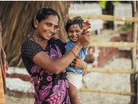US$1tn Economy Boost: Addressing the Gender Health Gap

A new report titled Closing the Women’s Health Gap: A $1 Trillion Opportunity to Improve Lives and Economies analyses the health conditions impacting women, and identifies the potential economic benefits of closing the health gap.
The report has been published at The World Economic Forum Annual Meeting 2024 in Davos-Klosters, Switzerland by a public-private alliance including Ferring Pharmaceuticals, the McKinsey Health Institute, and the World Economic Forum.
It identifies how failings in the health industry can be addressed to cut down the time women spend in poor health by almost two-thirds, improve the health of over 3.9 billion people, and add US$1tn to the global economy annually by 2040.
The report finds that, on average, women spend a quarter more of their lives in poor health in comparison to men, and that health conditions that uniquely or disproportionately affect women limit the ability of women to engage in the workforce and earn a living.
Economic prosperity linked to better health
Improved health is directly linked to economic prosperity, with the report finding that closing the health gap could lead to a 1.7% increase in per capita GDP, with every US$1 invested in these efforts potentially unlocking US$3 in economic growth.
“Our analysis demonstrates that addressing the women’s health gap and investing in women’s health must be a priority for every country,” explains Shyam Bishen, Head of the Centre for Health and Healthcare at the World Economic Forum.
“Beyond improving women’s quality of life, ensuring women have access to innovations in healthcare is one of the best investments that countries can make for their societies and their economies.”
With over 25 years of experience in global healthcare, Bishen has shaped global health and healthcare agendas at the World Economic Forum since 2022. Alongside this role, he is also currently a member of the board of directors of PMNCH for Women`s, Children`s, and Adolescents` Health and Innovations in Healthcare, an executive committee member for the Partnership for Health System Sustainability and Resilience, and Chairman of the Board of the Global Girls Scholarship Foundation. Previously, he was the Regional Director of the Bill & Melinda Gates Foundation.
“Investing in women’s health goes far beyond individual women. It is a direct investment in families, communities, societies and economies,” believes Anita Zaidi, President, Gender Equality Division, at the Bill & Melinda Gates Foundation.
“Our collective future rests on closing the women’s health gap.”
Zaidi has dedicated her career and life’s work to saving children’s lives and empowering women everywhere. As a registered physician, her career began working in infant survival in marginalised communities in Pakistan. She has led the Bill & Melinda Gates Foundation efforts to achieve gender equality by integrating gender across the foundation’s global work and investing in women’s economic empowerment, women’s leadership, and removing the barriers for women and girls to survive and thrive since 2020, having joined the company in 2014.
The Global Alliance for Women’s Health
To re-shape the future of women’s health and therefore boost the global economy, the World Economic Forum has founded the Global Alliance for Women’s Health, co-chaired by Nisia Trindade Lima, Minister of Health of Brazil, and Zaidi.
The multi-sector global platform, guided by its influential, multi-sector governing board, will invest in women to bridge the health gap.
US$55m has been pledged to improve women’s health outcomes by alliance partners which includes government leaders and representatives from the private sector, entertainment industry and philanthropic space.
“Quality, affordable, and accessible healthcare, particularly in the context of women's health, is a critical aspect of ensuring the well-being of women,” said Trindade Lima.
“This is a critical moment for a greater mobilisation across sectors to invest in women’s health, keeping in mind the imperatives of equity and integral care.”
Trindade Lima is the first woman to head the Ministry of Health in Brazil, having previously been the first woman to preside over historic science and technology institution and international reference the Oswaldo Cruz Foundation between 2017 and 2022. She earned her PhD in Sociology and master’s in Political Science from the University Research Institute of Rio de Janeiro, having gained her undergraduate degree in Social Sciences from the State University of Rio de Janeiro.
Board members include:
- Catherine Russell, Executive Director, UNICEF
- Elisabeth Staudinger, Member of the Board, Siemens Healthineers
- Nadia Fettah Alaoui, Minister of Economy and Finance of Morocco
- Nakhumicha S. Wafula, Cabinet Secretary for Health of Kenya
- Shyam Bishen, Head of Health and Healthcare Centre, World Economic Forum
- Per Falk, President, Ferring Pharmaceuticals
- Victor Dzau, President, National Academy of Medicine
**************
Make sure you check out the latest industry news and insights at Healthcare Digital and also sign up to our global conference series - Tech & AI LIVE 2024
**************
Healthcare Digital is a BizClik brand
**************




